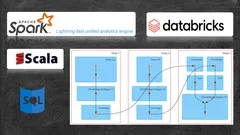
Integrating Business Intelligence Tools with Databricks 
This course explores the integration of Databricks with popular business intelligence tools, including Power BI, Tableau, and Qlik Replicate, to enable efficient analysis of large datasets. ▼
ADVERTISEMENT
Course Feature
![]() Cost:
Cost:
Free Trial
![]() Provider:
Provider:
Pluralsight
![]() Certificate:
Certificate:
Paid Certification
![]() Language:
Language:
English
![]() Start Date:
Start Date:
On-Demand
Course Overview
❗The content presented here is sourced directly from Pluralsight platform. For comprehensive course details, including enrollment information, simply click on the 'Go to class' link on our website.
Updated in [April 29th, 2023]
What does this course tell?
(Please note that the following overview content is from the original platform)
The best way to analyze big data may often involve the use of a combination of platforms. This course delves into the integration of Databricks with BI tools such as Power BI, Tableau, and Qlik Replicate to perform business intelligence tasks.
While Databricks is a powerful platform which supports a variety of business intelligence functions on its own, there will be use cases where it is necessary to link this service with external BI tools. In this course, Integrating Business Intelligence Tools with Databricks, you'll learn the integrations available for Power BI, Tableau, and Qlik Replicate. First, you'll explore the need for tool integrations with Databricks, including the use of the Partner Connect feature to make such integrations seamless. Then, you'll discover the hands-on portion of the course which looks into the precise steps involved in connecting Power BI and Tableau to a Databricks workspace. Finally, you'll learn how data in a SQL database such as SQL Server can be replicated in Databricks using the Qlik Replicate utility. Once you complete this course, you will recognize precisely when BI tool integrations should be used, and how these can be implemented using the resources available in Databricks.
We consider the value of this course from multiple aspects, and finally summarize it for you from three aspects: personal skills, career development, and further study:
(Kindly be aware that our content is optimized by AI tools while also undergoing moderation carefully from our editorial staff.)
What skills and knowledge will you acquire during this course?
By completing this course, users will acquire the skills to recognize when BI tool integrations should be used, and how to implement these integrations using the resources available in Databricks. They will be able to use the Partner Connect feature to make integrations seamless, and will be able to connect Power BI and Tableau to a Databricks workspace. Additionally, users will be able to replicate data in a SQL database such as SQL Server in Databricks using the Qlik Replicate utility. These skills and knowledge can be used to develop more efficient and effective data analysis processes, as well as to create more powerful data visualizations.
How does this course contribute to professional growth?
This course, Integrating Business Intelligence Tools with Databricks, provides learners with the knowledge and skills necessary to recognize when BI tool integrations should be used, and how to implement these integrations using the resources available in Databricks. By completing this course, learners will be able to develop more efficient and effective data analysis processes, as well as create more powerful data visualizations. This knowledge can be used to pursue a variety of career paths, such as Data Scientist, Business Intelligence Analyst, Data Engineer, and Data Architect. As the need for data-driven decision making increases, the demand for professionals with these skills is expected to grow. Therefore, this course can contribute to professional growth by providing learners with the skills and knowledge necessary to pursue these career paths.
Is this course suitable for preparing further education?
This course, Integrating Business Intelligence Tools with Databricks, provides an overview of the integrations available for Power BI, Tableau, and Qlik Replicate with Databricks. It covers the need for tool integrations with Databricks, including the use of the Partner Connect feature to make such integrations seamless. It also looks into the precise steps involved in connecting Power BI and Tableau to a Databricks workspace, as well as how data in a SQL database such as SQL Server can be replicated in Databricks using the Qlik Replicate utility. By completing this course, users will gain the knowledge and skills necessary to recognize precisely when BI tool integrations should be used, and how these can be implemented using the resources available in Databricks. This knowledge can be used to develop more efficient and effective data analysis processes, as well as to create more powerful data visualizations. Therefore, this course is suitable for preparing further education in data analysis and visualization, as well as in the use of BI tools such as Power BI, Tableau, and Qlik Replicate.
Course Provider

Provider Pluralsight's Stats at AZClass
Pluralsight ranked 16th on the Best Medium Workplaces List.
Pluralsight ranked 20th on the Forbes Cloud 100 list of the top 100 private cloud companies in the world.
Pluralsight Ranked on the Best Workplaces for Women List for the second consecutive year.
AZ Class hope that this free trial Pluralsight course can help your Databricks skills no matter in career or in further education. Even if you are only slightly interested, you can take Integrating Business Intelligence Tools with Databricks course with confidence!
Discussion and Reviews
0.0 (Based on 0 reviews)
Explore Similar Online Courses

Premiere Pro : Color grading from zero to hero

Work from Home as a Creative

Python for Informatics: Exploring Information

Social Network Analysis

Introduction to Systematic Review and Meta-Analysis

The Analytics Edge

DCO042 - Python For Informatics

Causal Diagrams: Draw Your Assumptions Before Your Conclusions

Whole genome sequencing of bacterial genomes - tools and applications

Databricks Fundamentals & Apache Spark Core

Databricks Essentials for Spark Developers (Azure and AWS)


Start your review of Integrating Business Intelligence Tools with Databricks